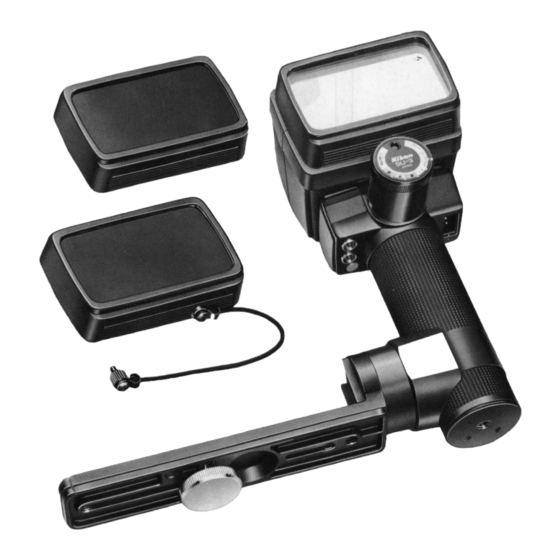Nikon SB-140 Instrukcja obsługi - Strona 29
Przeglądaj online lub pobierz pdf Instrukcja obsługi dla Lampa błyskowa aparatu Nikon SB-140. Nikon SB-140 39 stron.

Ready-Light
@
When the
external power is
turned on,
the
ready-light at
the back of the
8B-140
lights
up to indicate
the 8B-140
is
recycled and ready to
fire.
The ready-light
lights
up
when
the
8B
-140 is
recycled
to
appro)(.
80
%
of full capacity-
wait a
few
extra seconds when shooting subjects
located
at
the
far
limit
of the auto shooting
range.
In automatic operation
,
the ready-light blinks for a few
seconds everytime the flash fires at its
maximum
output,
showing
that light
may be insufficient and underexposure
may
occur.
In this
case,
reset the lens to a wider aperture
or
move
closer to
the
subject.
Note that when batteries are nearly
exhausted,
the
light
output of
the
flash
unit
decreases.
Flash Head
@
For
shooting in visible
light,
to soften shadows and
lower
contrast for indoor
snapshots,
you can tilt the flash
head
up and simultaneously rotate it
to the left or
right
to
bounce light off the ceiling or
walls.
The SB
-140's
flash
head can
be tilted back
as
much
as
120°
and
rotated
120°
to the
left
and 120° to the right
;
click-stops are
pro-
vided at 30°
,
60°
,
90°
,
and
120°
for
both
tilting and
rotat-
ing
movements.
However,
when the flash
head is
tilted a full
120°,
it
cannot
be
rotated to
the left
or right.
Tilt may
also be
restricted,
depending on the
degree
of
rotation.
Surfaces
used
for bouncing light
should
be
white or silver
to prevent color
photographs from
coming out with an
unnatural color cast.
Do
not bounce the
flash
for
UV
or infrared shooting.
Open-Flash Button
®
The
red open-flash
button is used to fire the
flash
unit
manually
without
having to trip the
camera 's shutter.
By removing the
connecting cord
from the
camera, set-
ting the
camera to
B,
and
pushing the
open-flash
button
repeatedly,
you can create multiple-exposure
"strobo-
scopic
"
effects or paint the
scene
with light. The open-
flash button can also
be used
in conjunction
with
the
ready-light
to determine the possibility of correct
exposure
when shooting
on
automatic
.
This is especially useful for
bounce flash.
After
setting up
the
shot,
push
the
open-
flash
button
.
If the
ready-light
does not blink,
you can
take
the
picture.
If
it
does
blink indicating a
possibility
of
under-
exposure,
use a wider aperture,
or move the flash closer
to the subject
or bounce
surface
.
29
